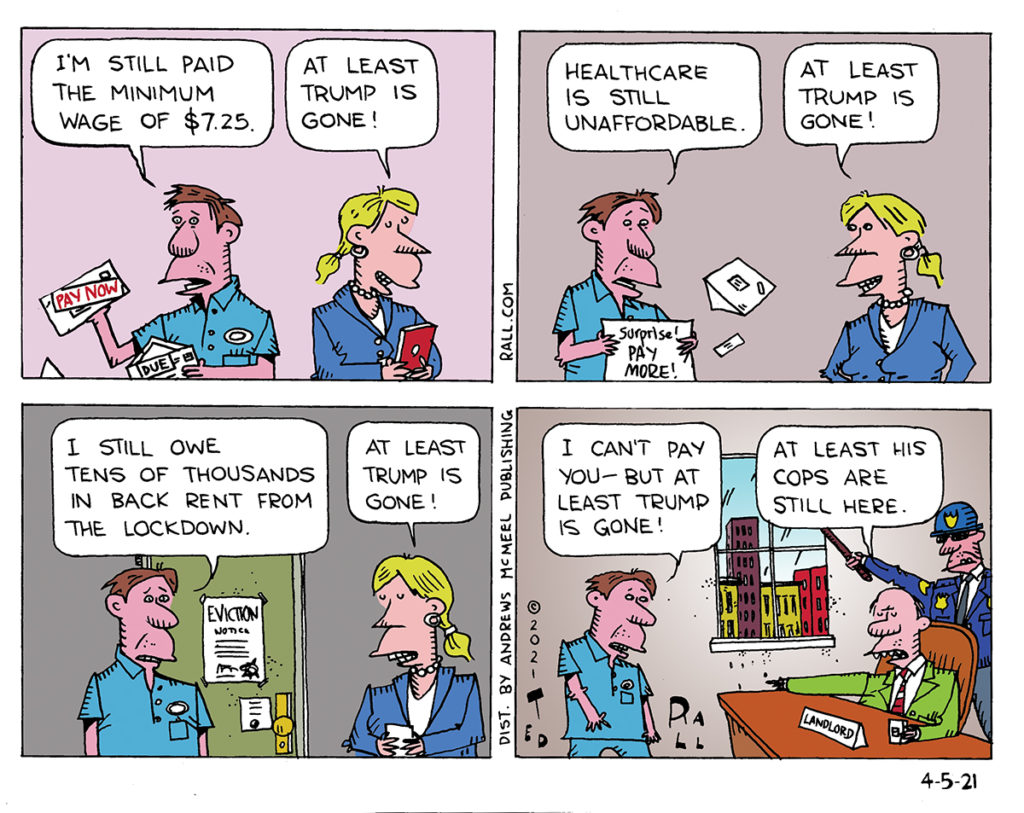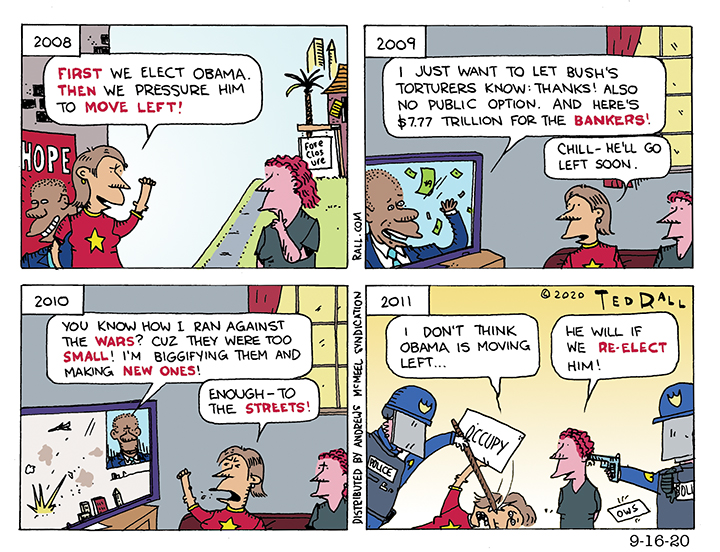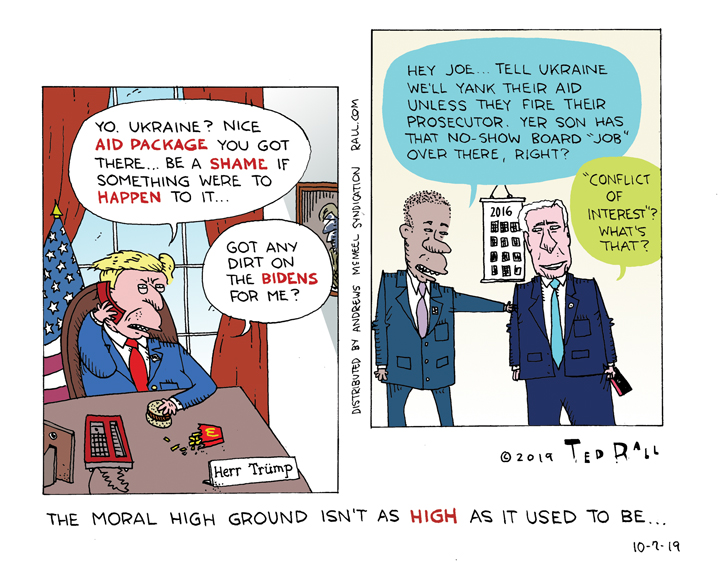President Joe Biden has ordered complete withdrawal of American troops from Afghanistan, without conditions, on or before September 11, 2021. Better 20 years late than never.
Afghanistan Under the Taliban: It Won’t Be Like Last Time
We’ve been in Afghanistan 20 years, Joe Biden’s generals told him. All we need is a little more time. The president overruled them, ordering a complete withdrawal of American troops by September 11th.
Madiha Afzal and Michael O’Hanlon of the Brookings Institution articulate the opposition to Biden’s decision to call it quits. Remove the U.S. occupation forces that have maintained stability, they worry, and civil war will soon follow, culminating in the overthrow of the U.S.-backed government in Kabul and the return of the Taliban. They think it will be the late 1990s all over again: women back under burqas, stonings, 14th century Islam providing a safe haven for anti-Western terrorist groups like Al Qaeda.
“The most likely outcome of any quick troop exit this year is very ugly, including ethnic cleansing, mass slaughter, and the ultimate dismemberment of the country,” Ms. Afzal and Mr. O’Hanlon write in USA Today. “No one can see the future, of course, but this type of outcome seems much more likely than any smooth transition to a new government run by a kinder, gentler, more moderate Taliban.” They urge a slower long-term drawdown.
I think they’re wrong.
I’m not clairvoyant. Yet I did foresee that the U.S. would follow the British and Soviet armies and meet defeat in the Hindu Kush: “We’ve lost this war, not because they’re good or we’re not, but because of who we are,” I wrote from Afghanistan in December 2001, where I worked as an unembedded reporter for The Village Voice. “The American Empire can’t spend the bodies or the time or the cash to fix this crazyass place, because in the final analysis, election-year W. was right—we’re not nation builders.”
Unlike the Brookings authors I’m more optimistic about Afghanistan without U.S. occupation forces than with them. First, whatever stability the U.S. and its allies have brought to Afghanistan is as artificial as the finger of the Dutch boy plugging the hole in the dike. The rural-based Taliban are like the sea, an inevitable force waiting to pour in. Whether or not we care for the end result, we can’t forestall the inevitability of a people’s self-determination at the cost of American and Afghan lives.
More importantly, the coalition presence has changed Afghanistan forever. When the Taliban ran most of the nation from 1996 to 2001, their draconian measures satisfied a desperate need for security in a place overridden with banditry, opium trafficking and addiction. Infrastructure was nonexistent: no phones, no electricity, no paved roads, no central monetary system. Afghans asked me to take their photos with my digital camera because no one owned a mirror; this was the first time in their lives they could see themselves.
Though security remains an issue, the coalition has built roads and highways throughout the country. We haven’t built a nation. But we have installed stuff. Cellphone service is more reliable and affordable than in the U.S. Cities like Kabul, Mazar-i-Sharif and Herat are bursting at the seams with new construction. Access to the Internet is widespread in urban areas. Mineral and oil reserves, previously untapped due to lack of capital investment, are beginning to come online thanks to China and other countries.
Two decades of occupation have changed culture in surprising ways. Herat, in the northwest near the borders with Turkmenistan and Iran, was dotted with pizzerias when I was there in 2010. Young men in Mazar brazenly ignored strictures against drinking and eating during the daytime during Ramadan. I saw a couple making out in a park in Kabul.
The Taliban, or more precisely the neo-Taliban who have replaced them, are more moderate because they operate in a modernized environment.
Though they share their name and religious fundamentalism with their ascetic forebears who grew up in the madrassas lining Pakistan’s tribal areas, today’s neo-Taliban are sophisticated cynics, men more concerned with making money then enforcing sharia law. The Taliban burned poppy fields. The neo-Taliban profits from them. The Taliban first gained popular support in 1996 by killing kidnappers. The neo-Taliban runs checkpoints and ambush points where they seize victims and hold them for ransom. So while the world has just cause for concern about what happens next, we should understand that forthcoming evils will be new ones, not a simplistic replay of Taliban 1.0.
In a country where every gunman is for hire, the regime installed by the United States in 2001 relies far more on funding than direct military defense. With more than $12 billion in aid pouring in from last year through 2024, the government led by Ashraf Ghani could easily outlive most expectations. Still, it’s not hard to imagine the U.S. and its Western allies losing interest and cutting the cash flow after 2025, opening a power vacuum that the Taliban—which either fully controls or vies for control of 67% of Afghan districts—would fill.
Concern that Afghanistan will return to the barbarism of the late 1990s and that Afghan women will suffer dramatic setbacks is misleading because, in the rural majority of the country, the politics and culture of the late 1990s never disappeared. Women never stopped wearing the burqa and continue to be stoned to death, most recently last year in Ghor Province. Young boys are routinely raped, a practice to which American troops were ordered to turn a blind eye. Were the Taliban to return to national power, life in most of Afghanistan wouldn’t change.
Nor would the more liberal cities be greatly affected. Afghanistan’s economy generates nearly $20 billion in annual GDP. An incoming national government run by the profit-oriented neo-Taliban would be hesitant to interfere with the engine of that economic activity, the big cities and the “ring road” highway network that connects them. We would probably see a crude version of the “one country two systems” form of governance that China uses in Hong Kong: girls schools and tolerance for personal freedoms in central Kabul, sharia law and grinding poverty out in the sticks.
As demonstrated by their engagement in the Doha peace process overseen by the Trump Administration, the neo-Taliban want trade and formal diplomatic ties with other countries, something the Taliban could not obtain from 1996 to 2001, when they were totally isolated from the rest of the world. The need to maintain international connections would be a moderating influence, making worst-case scenarios like harboring extremist groups, ethnic cleansing and disintegration unlikely.
None of this is to say that Afghanistan will become a Central and South Asian paradise if and when the neo-Taliban come to power in Kabul. The corrupt and dogmatic neo-Taliban will likely function as an authoritarian narcostate with trappings of rough religiosity, like a hardscrabble Saudi Arabia that exports heroin. Afghanistan will present new challenges. But it will be mostly up to the people of Afghanistan—traumatized, energetic and influenced by 20 years of Western values—to address them.
(Ted Rall (Twitter: @tedrall), the political cartoonist, columnist and graphic novelist, is the author of the upcoming graphic novel about a journalist gone bad, “The Stringer.” Now available to order. You can support Ted’s hard-hitting political cartoons and columns and see his work first by sponsoring his work on Patreon.)
My Predictions for Biden’s Probably-Truncated Presidency
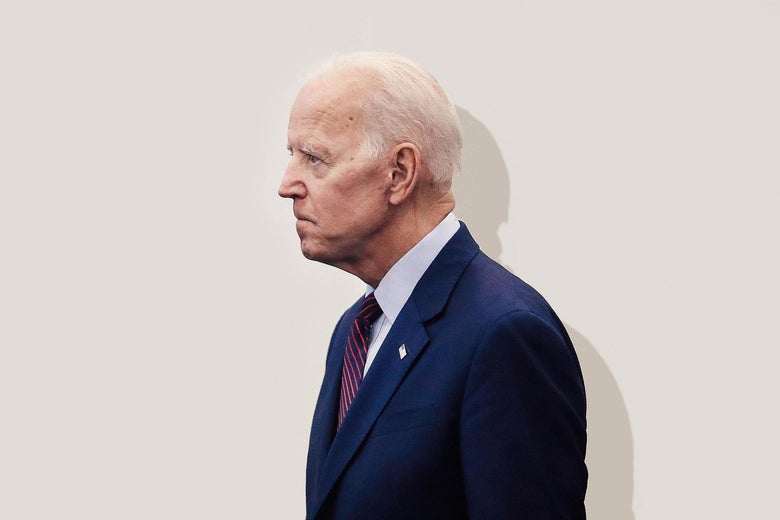
Beginning in March 2016 I repeatedly and almost famously warned overconfident Democrats—who ridiculed me for saying so—that Donald Trump would probably win the 2016 election. Days after Trump’s “softly sensuous” inauguration I accurately predicted the next four years: “Three scenarios show us what everyday life in Trumpian America will probably feel like: Third World dictatorships, prison and having an alcoholic parent.”
“In a dictatorship,” I noted, “particularly where the despot is a megalomaniac in the vein of a Saddam Hussein or a Muammar Gaddafi, citizens obsess over the Great Leader’s every move.” Never have the American people obsessed for four exhausting years over a president as we did over Trump and his autocratic style.
“People who have done time will tell you that it’s important to study the guards, particularly the sadistic ones.” Like prison inmates, we studied Trump and his tweets and his strange corrupt family incessantly in a vain attempt to isolate the methods to his multiple madnesses.
As I concluded in January 2017: “It’s never fun to be Cassandra.”
Now it’s time to weigh in on what Joe Biden’s first — and despite his recent statement to the contrary, almost certainly only — term will probably look like.
Spoiler alert: it probably won’t last four years.
There’s a reason candidate Biden barely campaigned and almost never spoke extemporaneously, and that President Biden has only given one highly cringy press conference so far, a record low in the modern era. Biden, 78, is the oldest man to have taken the oath of office. And while a lot of 78-year-olds are physically vigorous and mentally sharp, Biden isn’t one of them.
Biden’s cabal of Obama-era handlers are doing their best to hide their fading commander-in-chief and his obvious-to-all-non-Democrats infirmities, running the country from behind the scenes. His media allies have sacrificed their last vestige of dignity in their heroic support for the Dems’ ridiculous “nothing to see here” narrative.
As professional gamblers evaluate the president’s health and political performance, posted odds that he’ll remain in office through January 19, 2025—when he’ll be 82—have already plunged from 75% to 60%. My guess is that no one is more aware of Biden’s condition than DNC bosses. They would like Biden to hang on until after the November 2022 midterm elections, then step aside in order to allow Vice President Kamala Harris a year of incumbency, which could bolster her case for 2024.
Biden can still read a speech. But he is a husk, a placeholder leader like Pope Benedict XVI, who like Biden became pope at age 78. Benedict resigned at age 85, citing old age.
Following Trump’s bipolar rule and violent departure from office, Biden’s courtly elder-statesman style and successful passage of the $1.9 trillion coronavirus relief bill has him enjoying high approval ratings. But failures of commission and omission lie ahead. It’s mostly downhill from here.
The next major item on the Biden Administration’s legislative agenda is a $2.2 trillion infrastructure bill. Until recently building stuff seemed like one of the few areas in which a bipartisan grand bargain might be possible. Now, however, Senate minority leader Mitch McConnell has united the GOP in opposition. With DINOs like Joe Manchin of West Virginia going wobbly, it seems destined for outright defeat or, worse because it only pretends to fix the issue, severe dilution.
Voters judge presidential success and failure on two metrics. First, did the president correctly identify the problems people care about most? Second, did they fix those problems or at least do their best to try?
In part because they listened to progressives, Biden’s people wisely put money into people’s pockets to help them recover from the economic pain of the COVID-19 lockdown. As checks arrive this month, voters will feel warm fuzzies for the Democrats. But it wasn’t nearly enough. What happens in two or three months? Those single $1400 payments, a tiny fraction of a whole year of fiscal pain, will be spent and gone. The eviction and foreclosure moratorium ends June 30th. There is no indication that the White House plans another relief package.
Look for a long hot summer as complacency deteriorates into despair.
Biden’s presidency will likely crash on the shoals of the country’s numerous long-neglected problems. Legislation to increase the minimum wage from $7.25 an hour will be tepid to nonexistent. The same goes for student loan debt relief. Biden promised to add a public option to the Affordable Care Act but there’s no sign of life there either. He talks a good game on racial justice yet offers nothing by way of forced federal reform of local policing.
If I’m right, the second two years of the Administration will belong to Kamala Harris as of 2023.
She is young, charismatic and relatively energetic. She will make the most of her historical moment as the first woman of color to hold the nation’s highest political office; the media will be on her side. But if history repeats itself by punishing the party in power Democrats will likely lose seats in the House and control of the Senate in the midterms, leaving her in an even worse position to get anything done in Congress. Nevertheless, she’ll be a formidable candidate in 2024.
As befitted him, Trump went out with a bang.
Biden will end with a whimper.
(Ted Rall (Twitter: @tedrall), the political cartoonist, columnist and graphic novelist, is the author of the upcoming graphic novel about a journalist gone bad, “The Stringer.” Now available for pre-order. You can support Ted’s hard-hitting political cartoons and columns and see his work first by sponsoring his work on Patreon.)
Biden and the Democrats Could Change Everything. But They Won’t Try.

“When someone shows you who they are,” Maya Angelou said, “believe them the first time.” We’re about to be reminded who and what the corporate-owned Democratic Party is—something they showed us in 2009.
A pair of upset victories in the widely-watched pair of Georgia senatorial runoff elections has handed Democrats what they said they needed to get big things done: control of the White House, the House of Representatives and the U.S. Senate. If they want, they have argued over the last year, Democrats will be able to push through a lot of important legislation on the liberal agenda: a dramatic increase in the minimum wage, student loan forgiveness, an eviction ban, Medicare For All, expanded economic stimulus and addressing the climate crisis come to mind.
They don’t want to. They won’t try.
And they’ll have an excuse. Democrats will still be 10 votes short of the supermajority needed to override Republican filibusters. The billion dollars spent to elect those two Democrats in Georgia created some interesting symbolism about the rising influence of Black voters and hopes for further Democratic inroads in the South, but it didn’t defang Mitch McConnell. Gridlock goes on.
Not that Biden and his pet Democratic Congress have much of an agenda. He’ll reverse Trump’s executive orders on stuff like rejoining the Paris Agreement but he won’t move the policy meter left of where it stood under Obama—a guy who was so far right of progressives that they launched the Occupy Wall Street movement to oppose him. Biden campaigned tepidly on adding a “public option” to Obamacare, but McConnell will almost certainly block it and anything else that requires GOP votes. The exception, of course, will be the next bloated military spending bill. For six consecutive decades Americans have been able to count on death, taxes, rising income inequality and bipartisan support for blowing up brown people in countries we can’t find on a map with $640 toilet seats.
But you shouldn’t let the filibuster get you down. Even if Nonexistent God were to smite 10 deserving GOP senators with the coronaplague and said smitten senators had represented states whose Democratic governors were to appoint their replacements thus giving the Bidenocrats a coveted 60-vote supermajority, nothing would get better.
We know this because it happened 12 years ago, during the 111th Congress.
Obama’s presidency began in the strongest power position of any Democrat since FDR. With the economy in a tailspin and shedding hundreds of thousands of jobs a month—back then we still thought that was a lot—voters were both desperate and optimistic that our young new leader would lead us out of the Great Recession. He had a 68% approval rating, indicating bipartisan support. Democrats had picked up 21 seats in the House, giving them a 257-to-178 majority. They had a 59-to-41 majority in the Senate. (This included two independents, Bernie Sanders and Joe Lieberman, who caucused with Democrats.) They were one tantalizing vote short of a supermajority.
That changed on September 24, 2009, when the seat vacated by Ted Kennedy’s death was temporarily filled by a fellow Democrat, until February 4, 2010, when Scott Brown, a Republican, won the Kennedy spot in a special election.
Democratic apologists explain away Obama’s lack of progress on progressive policy goals during that halcyon period by pointing out that total Democratic control of the White House and both houses of Congress “only” lasted four months, during which they passed the Affordable Care Act.
Let’s temporarily set aside the question of how it is that Ronald Reagan rammed an agenda so far right that it still affects all of us today through a 243-to-191 Democratic House and “just” 53 GOP seats in the Senate. What about those four magic months during which Obama could have gone as far left as he and his fellow Democrats wanted?
Well, Democrats did pass one of those 60 straight bloated defense bills. That would have happened under Ronald Reagan or George W. Bush. They extended unemployment benefits by 14 to 20 weeks, depending on in which state the poor jobless schmuck lived. And the ACA. And that’s it.
In order to secure the vote of Lieberman—who represented the insurance company-owned state of Connecticut—the ACA did not include the “public option” that Obama had promised during his campaign. DNC chairman Howard Dean, then in his pre-neutered state, called the deletion of the public option “the collapse of healthcare reform in the United States Senate. And, honestly, the best thing to do right now is kill the Senate bill and go back to the House and start the reconciliation process, where you only need 51 votes and it would be a much simpler bill.” He was right, but Obama, his House and his supermajoritarian Senate didn’t bother. Like Lieberman, they cared about insurers, not patients.
Four months isn’t that long. Yet Reagan used less time than that to crush his opponents and pass tax cuts for the rich that shredded the New Deal social safety net. “The president used the bully pulpit to overcome opposition among House Democrats, building support for the cuts,” recalled Princeton historian Julian Zelizer. “He gave a speech on television, urging citizens to write their legislators and tell them to support the cuts. House Democrats, now the sole base for the party in Washington, joined in once they saw the public pressure.” LBJ took less time to “set Congress on the path to passing the Civil Rights Act of 1964, as well as a tax cut and Medicare,” wrote presidential scholar Jeffrey Tulis. FDR created modern liberalism in under three months. You can imagine what Trump would have done during four months of a GOP House and Senate supermajority.
Republicans didn’t prevent Obama from taking on the minimum wage or student loan debt or poverty. Obama had four months to do those things. No one could have stopped him. He didn’t try.
And neither would Biden if he had the chance.
CORRECTED 1/6/21 to reflect that Brown won a statewide special election. He was not appointed, as I wrote initially. I regret the error.
(Ted Rall (Twitter: @tedrall), the political cartoonist, columnist and graphic novelist, is the author of “Political Suicide: The Fight for the Soul of the Democratic Party.” You can support Ted’s hard-hitting political cartoons and columns and see his work first by sponsoring his work on Patreon.)
December Will Be Very Dangerous

It’s too early to celebrate, back-to-brunch Democrats.
Liberal voters are counting Biden’s corporatist cabinet picks. But we still don’t know for sure that Trump will let them hatch. There’s still a significant chance — I would put it at 50-50 — that the “outgoing” president will engineer a coup d’état in order to remain in power.
Democratic-aligned media outlets are promulgating wishful thinking. They’re crowing about a routine, peaceful transfer of power. They’re making fun of the Trump campaign’s losses in court challenges to the election results and making light of the president’s hope that faithless electors will trigger the 12th Amendment scenario by causing Biden to fall short of 270. The mainstream pundit class points to the bureaucracy’s granting of access to Biden’s transition team and to excerpts from a recent Trump interview as evidence that he has accepted defeat. (In fact, Trump said that if the electoral college votes for Biden, they will have “made a mistake, ’cause this election was a fraud.”)
But they are ignoring human motivation.
Trump has every reason to use radical means to remain president, democracy and constitution be damned. If he leaves the White House on January 20, the former president loses executive immunity and becomes exposed to an array of fraud and corruption charges related to his businesses. The New York State charges are the most hazardous. He could well be convicted and sent to prison on those. Even if Biden were to issue a presidential pardon, a law specifically directed at Trump ensures that a federal pardon would not apply to New York’s state convictions. Trump is an old man, hardly in good health. He could spend the rest of his life in prison — unless he declares martial law and becomes America’s first dictator.
Cynics, a group I usually identify with, believe that wealthy and powerful white guys like Donald Trump are never held accountable for their crimes, much less go to prison. For Trump, that has been the case so far. But there have been exceptions. As happened to Martin Shkreli, Bernie Madoff and Jeffrey Epstein, everything indicates that Trump’s white privilege card has been revoked. The ruling classes are dying to see Trump humiliated, perp-walked, and mug-shot in a jumpsuit that matches his skin tone. The neoliberals never considered the master of crass to be one of their own. Now he is a full-fledged class traitor, our Huey Long. Populist and verbally skeptical of the militarism and job-exporting free trade agreements that line the capitalists’ Cayman accounts, Trump has proven that a sizable portion of the American public—on the right, no less!—agrees with him. The elites despise him for this. They will not save him.
Trump’s lawsuits will fail. (He knows.) The electoral college will elect Biden.
Trump will then have five weeks to decide what to do. Await his fate at Mar-a-Lago? Trump isn’t passive, especially when he fears he’s going to lose. Fly to exile in Israel or Saudi Arabia? Netanyahu is too beholden to the U.S. to risk offending an incoming Biden Administration; Saudi Arabia is one of the most unpleasant places on earth.
Trump’s coup calculus is simple: what’s the worst-case scenario if he fails? Arrest and prison? He’ll be no worse off than if he didn’t try.
Trump has two major advantages that the usual coup plotter doesn’t. First is incumbency: he currently has his hands on the levers of power. He’s not looking to change anything; he’s trying to keep things the way they are. Second, he doesn’t have the support of the military—but he doesn’t need it. His would be a “police coup” carried out by the numerous local police departments whose unions endorsed him for reelection, alongside federalized state police and deputized paramilitary MAGA goons.
Leaders of the armed forces, the only institution that could stop Trump, would face an awful choice. If they remove the civilian head of government, even a rogue, they are carrying out a military coup. They would have to shoot at local police, many of whom are veterans. If the army were to stand down, they would be tacitly endorsing Trump’s police coup. My experience is, when people face two bad choices, they do nothing—which is why I don’t think Trump has to worry about the military.
History tells us how such a coup would go down. Newspapers will disappear, radio will go silent, television will go dark, the Internet will be turned off. Police checkpoints will spring up on city streets and along highways. After a short time, perhaps a few days, the president will inform us that it’s all for our own good, that he’s trying to protect America and democracy and everything beautiful, but that a state of emergency is necessary to preserve law and order. There will be curfews, martial law, a ban on political protests and gatherings. Communications will resume in a limited fashion. Even news media outlets that used to be critical of Trump will sing his praises.
In most other countries, a coup leader like Trump would face dogged resistance. But that usually requires socialists and communists; only a disciplined Marxist movement stands a chance at destabilizing an authoritarian regime. Fortunately for Trump, a century of ruthless oppression and right-wing propaganda has eliminated the actual left.
Trump set the stage for a coup by moving loyalists into key positions. After the election he fired the Secretary of Defense, a man notable because he refused to send the military to fight protesters on American streets, and replaced him with a toady. The Undersecretary of Defense for Intelligence also got the axe. He did the same to the Director of the Cybersecurity and Infrastructure Security Agency at Homeland Security. The directors of the CIA and FBI reportedly have targets on their backs as well. Wishful-thinking Democrats speculate that the firings are mere retribution by a spiteful Trump. If so, it’s interesting that Trump’s revenge is limited to key national security figures. Didn’t anyone in the Department of Agriculture ever piss him off?
“When you surround an army, leave an outlet free,” counsels Sun Tzu. “Do not press a desperate foe too hard.” The powers that be are ignoring this advice. If they were wise, they would approach Trump with a deal: go quietly, return to your real estate business, and you won’t be prosecuted. No more rallies. No more political campaigns.
Instead they have turned him into a cornered rat. Because the authorities are hell-bent on humiliating and destroying a sitting president, the American republic is about to go through one of its most dangerous months in history.
Trump might resign himself to months and years of court hearings, trials, prison for him and his family. But I wouldn’t count on it.
(Ted Rall (Twitter: @tedrall), the political cartoonist, columnist and graphic novelist, is the author of “Political Suicide: The Fight for the Soul of the Democratic Party.” You can support Ted’s hard-hitting political cartoons and columns and see his work first by sponsoring his work on Patreon.)
Mail-in Balloting, the 12th Amendment and Impending Doom
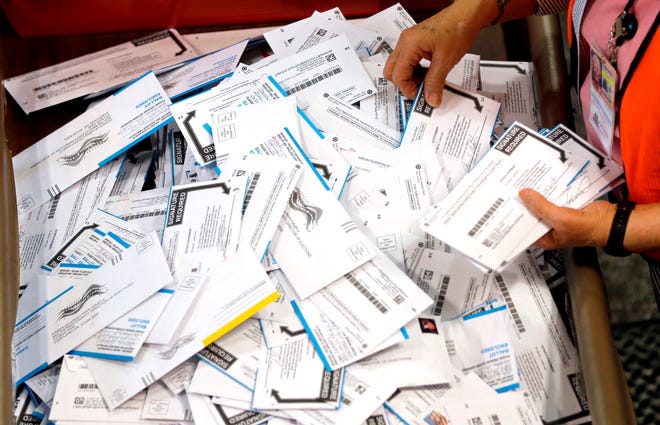
More than 80 million Americans are expected to cast mail-in ballots this fall, representing a 16-fold increase over 2016.
This is probably going to cause a constitutional crisis of epic proportions.
The problem isn’t the possibility of fraud that Donald Trump has been going on about. Cases of possible double voting or voting on behalf of dead people Daley-machine-style are statistically insignificant, amounting to at most 0.0025% of mail-in votes.
The real issue is that the ballots may not be counted on time, triggering the insanity of the 12th Amendment to the U.S. Constitution.
The date to remember is December 14th, when the delegations of the Electoral College meet in their respective states. That’s a hard deadline. Each delegation can only certify their state’s vote counts if they are 100% complete—machine votes cast in person at polling places on election day, early votes, absentee ballots, write-ins and, this year, COVID-19 mail-in ballots. If the state fails to certify on time, its electoral college votes aren’t counted.
Within each state, there is a canvassing/certification deadline for county officials to submit their results. Most are in late November. California, with a December 11th deadline, cuts it close and usually files its national certification last.
State election officials are doing their best to meet the challenge. They are hiring additional staff, buying new tabulation machines and installing drop boxes. Even assuming that they will be able to hire the additional personnel they need in the midst of the coronavirus pandemic, the practical impediments to meeting the December 14th deadline are daunting. Mail-in ballots are manually opened and signatures must be visually compared, sometimes several times, to Board of Election records.
Then there are technicalities. For example, 16 states require mail-in ballots to be submitted with an extra “privacy envelope.” In the battleground state of Pennsylvania, 6.4% of absentee ballots submitted in a 2019 election were rejected because voters neglected to insert their ballot inside the privacy envelope inside the mailing envelope—a significant margin that could change the outcome on a national level. Both parties are gearing up for legal challenges about issues like this across the nation.
“Every absentee or mailed ballot, even if dropped off directly at the designated county drop box or polling center, most likely will not get counted on Election Day, and it can easily be challenged and delayed and even rejected on a technicality,” Jed Shugerman writes at Time. “Every mailed or absentee ballot, in an envelope with signatures, is its own hanging chad, its own built-in legal delay.”
If enough states are embroiled in vote-counting controversies to prevent either President Trump or former Vice President Biden from achieving the 270 electoral votes required to declare them president-elect on December 14th, the obscure 12th Amendment kicks in.
Used only once—in 1825 to elect John Quincy Adams—the 12th Amendment triggers a bizarre “House of Cards” series of remedies guaranteed to eliminate any remaining belief that the Framers wrote a perfect document designed to withstand the test of time, or that the United States is a democracy.
After the new 117th Congress convenes on January 3rd, the House of Representatives would vote to elect the president and the Senate would elect the vice president. “Each state delegation gets one vote, and 26 votes are required to win [out of 50 states],” reports the Associated Press. “In the Senate…each senator gets a vote, with 51 votes [out of 100 seats] required to win.”
Even if Democrats enjoy another “blue wave” election that allows them to pick up congressional seats, they will not capture 26 state delegations in the House of Representatives. Trump would win. If Democrats have taken back the Senate, they could select a vice president to replace Mike Pence.
It wouldn’t matter if a newspaper recount were to determine later on that Biden should have won both a popular and electoral vote landslide. Trump would remain in the White House.
The Democratic Party and its allies in the media have been pushing mail-in balloting, but voters who want to see Joe Biden elected and are willing to brave the health risks should consider showing up for early in-person voting. In-person ballots are far less susceptible to rejection over technical issues like security envelopes, they are counted immediately and they thus meet the December 14th deadline for certification.
As my readers are aware, I do not support either Trump or Biden and will be voting third party, probably for the Greens, this fall. But I don’t support disenfranchisement either. I want everyone’s will to be expressed.
No matter what happens, no matter who wins, American politics are about to become extremely dangerous. Democracy fails when the losing side refuses to accept the legitimacy of the winning side. That will certainly be the case this year.
(Ted Rall (Twitter: @tedrall), the political cartoonist, columnist and graphic novelist, is the author of the biography “Political Suicide: The Fight for the Soul of the Democratic Party.” You can support Ted’s hard-hitting political cartoons and columns and see his work first by sponsoring his work on Patreon.)
First Elect Obama, Then Move Left!
Some liberals see politics like football, in which moving the ball closer to the goal means you are winning. Thus they are encouraging progressives to vote for Joe Biden, arguing that Biden’s centrism would be an improvement over Trump. Biden, they say, can be pressured more easily from the left than Trump. But that’ds not at all what happened when Biden’s boss was president.


